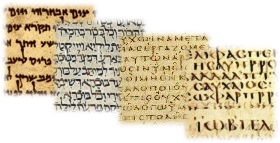
Textual Criticism
By Jeff A. Benner
When the various Hebrew, Aramaic, Greek and Latin manuscripts of the Bible are compared, a process called Textual Criticism; we often find variations in how these manuscripts read.
Genesis 4:8 provides a simple example of how this process works. In the Hebrew Aleppo codex this passage reads "And Cain said to his brother Abel, and it came to pass that they were in the field and Cain rose up toward his brother Abel and killed him." Missing from this passage is what Cain said to Abel and appears to be an accidental omission on the part of a scribe. However, when we examine this passage in the Greek Septuagint translation we find the missing words; "and Cain said to his brother Abel, Let us go out into the plain, and it came to pass that they were in the plain Cain rose up against Abel his brother and killed him." It appears that the Septuagint is working from a Hebrew manuscript that includes Cain's speech, while the Aleppo codex is working from a Hebrew manuscript that is missing the speech.
When we compare different English translations of Deuteronomy 32:8, we find very different readings. All of the English translations begin pretty much the same; "When the Most High gave the nations their inheritance, When He separated the sons of man, He set the boundaries of the peoples According to the number of the…" However, different translations have different renderings for the end of this verse.
King James Version – "…children of Israel"
Revised Standard Version – "…sons of God"
Young's Literal Translation – "…angels of God"
|
These differences can be solved by examining the different ancient texts to determine which one the translator was using for this verse.
Aleppo Codex - בני ישראל (children of Israel-matching the KJV)
Dead Sea Scrolls - בני אלוהים (sons of God-matching the RSV)
Greek Septuagint - ἀγγέλων θεοῦ[19] (angels of God-matching the YLT)
|
Each of these manuscripts is copying from a Hebrew source that differs from each other. The process of textual criticism compares these various readings to make a determination of which reading is the original. The consensus among scholars is that the original reading is בני אל (sons of El). Notice that the letters in these two Hebrew words (בני אל) can be found within all three Hebrew versions; בני ישראל (Aleppo Codex), בני אלוהים (Dead Sea Scroll) and בני אל (Hebrew translation of the Septuagint).
^ 19. This Greek phrase would be translated back into Hebrew as בני אל (sons/angels of God). The word אל (el) and אלהים (Elohiym) are both commonly translated as "God," but אל is the more primitive spelling that is commonly used among Semitic peoples for angels.
|






